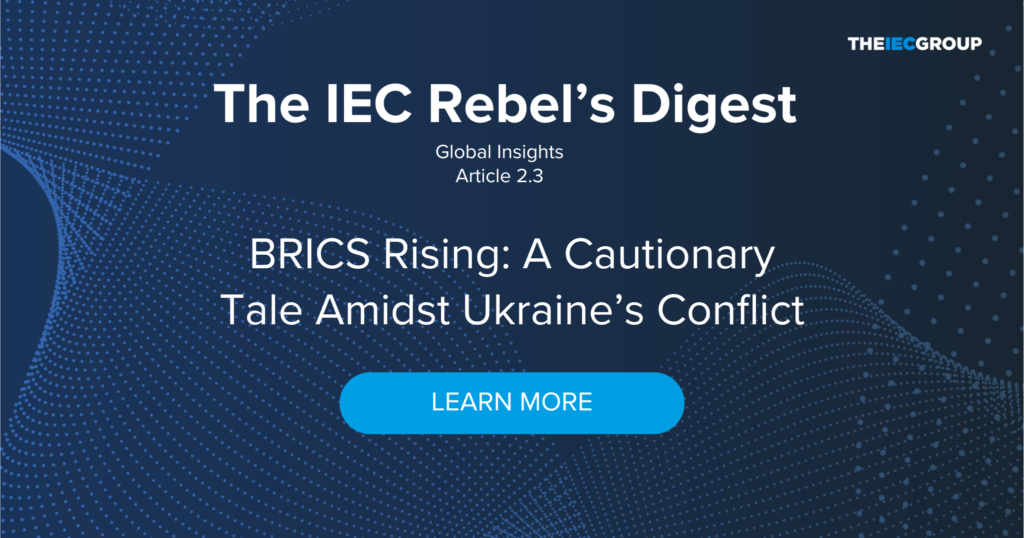Revitalised BRICS assert influence as Ukraine war drags on
But go gradually with investments in BRICS right now
As war rages and damages the global economy, the BRICS grouping of developing nations is suddenly being feted by the superpowers.
Originally including Brazil, Russia, India and China, the BRICs group is now set to expand to include South Africa, Saudi Arabia, Iran, Ethiopia, the United Arab Emirates, Argentina and Egypt.
Many more are knocking at the door.
While it will be challenging to come up with an acronym for that, the move and its timing in early August should be, appears to be, and is clearly aimed to be challenging to the world’s biggest powers.
China is a bit of an anomaly in the group. It is still a developing power, sure, but it is already a superpower, both economically and militarily.
Leader Xi Jinping’s increasingly autocratic rule at home and sabre-rattling in the South China Sea and elsewhere is being answered with economic push-back including technology and trade restrictions.
Russia, meanwhile, is rapidly becoming a basket case economically due to the war, sanctions and the developed world weaning itself off its oil and gas. More than 1.000 global corporations are divesting following the so-called “special operation” in Ukraine according to Yale School of Management
But it has still nukes.
As for India, its economy grew at the fastest rate in a year in the April-June quarter, according to Reuters, but economists are warning of a slowdown. President Modi’s nationalistic agenda and a low-profile conflict with China on its northern border has also cooled relationships with potential economic partners.
The signs suggest that while the BRICS collective is becoming a much more considerable counterweight to the US and the so-called West, the question of whether that can be sustained beyond the end of the Ukraine conflict remains.
The answer to that will lie in whether it can deliver cohesive international economic and political positions either within or as an alternative to those of the US dominated “international rules-based” order.
That order is built as much on soft cultural power as on hard power and nurtured by shared democratic values that have, admittedly, been strained of late.
Strained but not broken, that is. Donald Trump’s attempts to remain in office after losing an election have so far failed and the west (other than some US Republican congressmen) has only become more united as the horrific war in Ukraine drags on.
In contrast, key BRICS nations are being led by despots and hard men who, when not attacking their neighbours, engage in sabre rattling, the stoking of ethnic and religious differences and the undermining of democracy to bolster their own power.
For BRICS to truly exert increased influence in the world, its members need to either reclaim or deliver democracy and transitions of power like that seen in Brazil on 1 January 2023.
“I will govern for 215 million Brazilians, and not only for those who voted for me,” President Luiz Inácio Lula da Silva said in his inauguration speech.
“I will govern for all, looking to our bright common future and not through the rear-view mirror of a past of division and intolerance.”
Legitimacy and influence come from the people, but the people also need the kinds of opportunities only economic growth can deliver.
After one of the world’s worst COVID-19 responses, Brazil has stabilised politically, but its average growth of 0.6% over the last decade, is anaemic.
A reform of the country’s complex consumption tax to a value added tax model is under way and is definitely one to watch.
It is an important test of the new government not just because it is a key part of Lula’s plan to boost growth, but also because it has been tried before and failed.
Investors need to calibrate their risks with a clear understanding that international markets that appear economically sweet can quickly become geopolitically sour.
Key takeaways:
- When you plan global expansion, don’t put all your eggs in one basket:
- Don’t do what the 1,000 or more of global business that have invested in Russia and subsequently disinvested have done.
- Consider expanding in a low-risk fashion.
- Consider engaging an employer of record (EOR) that will help you put your foot in the water of the intended expansion territory before your whole leg gets snapped off by an unexpected predator.


